

How
to show your AHT
By Kady Harrington of Wytoka
American Hairless Terriers
![]()
Proud of your new American Hairless Terrier? Have you bought your first show dog or think your current AHT has what it takes to be a winner but don't know where to start? Here's a primer on how to get to - and through - your first show. The ideal way is to work with your breeder who can either help you first hand or recommend someone who can. Failing that finding a local mentor who has experience showing AHTs would be the thing. But if you're going it alone, these tips can help get you started. This is not meant to be a detailed training manual, just a "get started" information article. Check out "how to show" links for more training info. Hint: this is geared towards UKC shows. Many of the basics are the same for AKC shows, however the rules and entry procedures will differ.
-
Read and study the American Hairless Terrier breed standard. Now, read it again. Then look at your dog and compare it to what you read. First start by making sure your dog does not exhibit any disqualifying faults. While these faults don't mean your dog can't be a great pet it does mean it will result in him being disqualified from the show ring. Now - make sure your dog does not exhibit serious faults according to the standard. No dog is perfect but a serious fault will probably prevent it from winning. Don't feel he measures up? Don't worry - he's still a wonderful and loving pet, so enjoy him. If you still want to delve into showing, contact a reputable breeder and let them know what you want so they can help you find a show potential puppy.
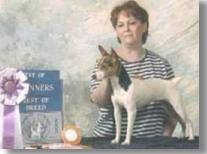
This Rat Terrier is definitely a winner!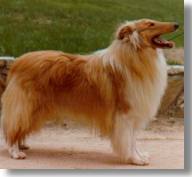
This lovely Collie meets his standard also.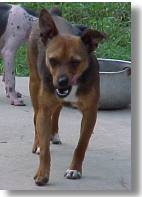
This cute AHT girl isn't quiet a show dog, but she's a loved pet for her family.
- OK - you feel
sure that your dog is a fitting example of the breed standard and
can take the competition. Next, is s/he UKC (That's United
Kennel Club) registered? The AHT shows primarily in UKC events
(however you may see some at National Canine Association or American
Rare Breed Association shows also). If you purchased your pup from
a reputable breeder you should have access to UKC registration. This
registration certifies your dog's purebred status (it does NOT guarantee
quality or show worthiness though!) - and you'll need that registration
number to enter shows and earn titles. Not registerable? That's OK
- love (and neuter!) your naked kid and talk to reputable breeders
about acquiring a show potential puppy.
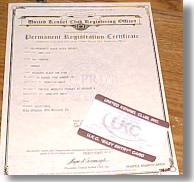 The registration and Easy Entry card you will receive when your pup is UKC registered to you.
The registration and Easy Entry card you will receive when your pup is UKC registered to you.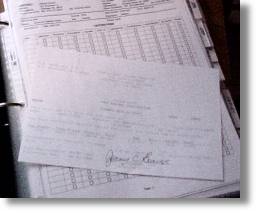
Keep your vet and other records organized. You may need something in a hurry and don't want to have to dig for it!
- Next - Is your
dog temperamentally suited to show? They don't all have to be whiz-bang
showoffs, but they DO need to be stable, friendly and accepting of
strangers. The judge - a strange person in a strange place - must
be able to check teeth, physical condition, etc. by touching. In addition
you will be in a place with many other people and dogs where your
dog must be able to behave appropriately.
- Your dog is
properly registered and a good example of the breed. Now what? Well,
you're excited and dying to know when a show is coming. So check out
the UKC
Events page for upcoming shows. They are organized by date and
by state. Most UKC shows allow you to enter the day of the show, so
be absolutely sure to note the entry times so you don't miss it! Or
you can download an entry form from the UKC web site, fill it out
and send it along with the posted entry fee to the Show Secretary
listed for the show you want to go to. Make sure you give yourself
some time before your first show to get ready!
- Now - you need
to begin some training for you AND Fido! Try looking for a local dog
"handling" class or puppy class...this will be the best
way to learn first hand how to do the show routine. Otherwise...first
s/he needs to be leash trained and able to trot next to your left
side in a straight line. And s/he has to do this without lunging,
dragging, fighting, jumping about or misbehaving. It sounds simple
but it does take practice. First get a good show lead appropriate
to your breed - usually a slip or "choke" collar or maybe
a martingale or terrier lead. Any pet supply catalog such as www.petedge.com
will have a selection of "show leads". Don't use your flashy
buckle collar with jingly tags! And don't be afraid to ask other AHT
exhibitor or owners what they use. It might help if you practice without
your dog first - draw a straight line and practice walking and trotting
on it neatly without looking down at the floor. If you can put a full
length mirror at the end that will help to. You don't want to be the
one weaving like you just got off a roller coaster! Now - work with
your dog until you can work as a team. Practice in a straight line
& going around in circles (to your left, or counterclockwise).
Don't encourage him to look up at you! This will throw off his movement
from the judge's perspective. Use lots of praise and positive reinforcement
and make it fun - you don't want to have a sad, reluctant dog in the
ring.
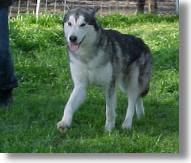
This young Malamute is learning to gait. You can see he is enjoying it also!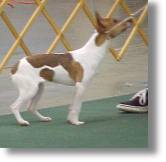 Oops! This AHT puppy is resisting.
Oops! This AHT puppy is resisting.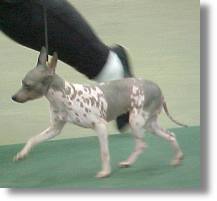
Can you do this? You're on your way to being ready!
- Congratulations!
You can walk! Sounds silly but by now you have probably seen the difference
in Fido dragging you down the street or sniffing every hydrant and
the walking required in the show ring! The next thing you need to
learn is to "stack". This means setting your dog up in a
standing position for the judge to be able to see, touch and evaluate.
Your dog will need to learn to allow you to do this. First, on a secure
surface, place your dog in a standing position. Make sure you are
on your dog's right side. Move the collar high up his neck behind
his ears and make sure it's snug (don't choke him though). Firmly
and gently run your hand over his shoulder and down to his outside
or left front elbow and move the leg to the proper position (from
the standard and reviewing photos or at shows you should have an idea
of how a stacked dog is positioned in your breed). Now do the same
to the inside or right front leg. Run your hand down his back and
to his outside (left) rear hock and position that leg and again the
same with the right rear leg. If needed hold his tail in the proper
position. Hmmm...this wasn't as easy as it sounded was it? OK - catch
your wiggly giggly puppy and start again. Be patient, firm and gentle.
Hint - don't move his legs by grabbing his feet. Move them by placing
your hand higher on his elbow or hock. Praise each time he does something
right and continue to provide positive reinforcement for standing
still and letting you do all this. DON'T expect your dog to learn
this all the first time! Use short training sessions (with our young
puppies we often only spend 5 minutes or less each day on this) and
persevere. When he all comes together and one day you find your dog
in the right position and you in the right position all at once you'll
feel great! Once he is comfortable with this try practicing on a grooming
table (an AHT is stacked on such a table for the judge to examine),
on the floor etc. A makeshift table can be made by using something
like a non slippery towel on a coffee table.
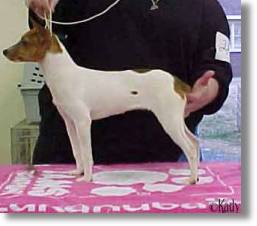
This AHT puppy is learning to stack on a table.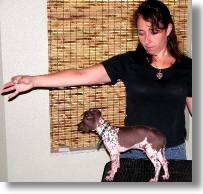
This young AHT puppy is stacking on a table for the first time. His owner is making it fun and interesting for him.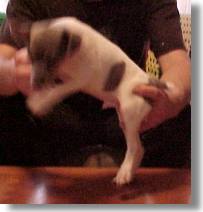
This Rat Terrier puppy is more interested in playing than showing. Use patience and praise to convince him it's fun.
- Aha! Now you
can both trot around gracefully and stack like you were meant for
the show ring. But there's some more. You need to arrange to have
friends, family, etc. touch your dog. While s/he is stacked your friend
needs to gently lift the lips and check the 'bite' (how the teeth
meet), run their hands down the shoulders, back, ribs and rear. Make
sure different people do this (not all at the same time of course).
Men, women - small, large. Try having them wear hats, perfume, ties,
large jewelry...anything you can think of that might startle your
dog. Now is the time to let him get used to it and be able to praise
his acceptance of odd things.
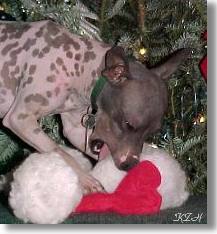 Make sure you introduce all kinds of different things. You don't want THIS to be your puppy's reaction in the showring!
Make sure you introduce all kinds of different things. You don't want THIS to be your puppy's reaction in the showring!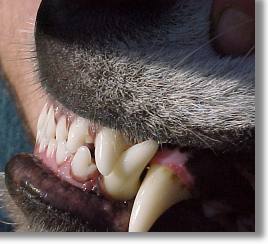 Teach your dog to 'grin and bear it', or at least let you lift the lips and inspect the teeth.
Teach your dog to 'grin and bear it', or at least let you lift the lips and inspect the teeth.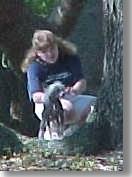
Some dogs get used to anything! This Chinese Crested is taking part in a film shoot. He is also a champion show dog.
- Ok, you're practicing,
you're feeling pretty good about the upcoming show. While you wait
you need to familiarize yourself with the RULES. Yep, every game has
them and dog shows are no different. The
UKC Rules can be found online at their site. READ them. ASK questions
on their forum if you don't understand. The rules spell out not only
the do's and don'ts but also tell you exactly how to figure out which
class you must enter (for instance puppy, senior, adult, etc.) and
how points are won. While you probably can't memorize them, at least
be familiar with them. You might want to order a copy of the rule
book in print to refer to if you have a question.
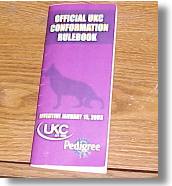
The UKC rule book is available online and in print.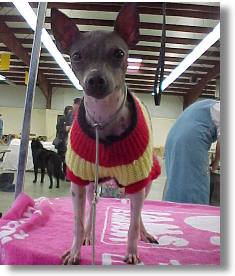
This AHT dog is ready for her show time! You want to be sure she's entered in the right class!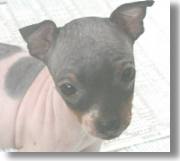
This cute AHT puppy has a ways to go before she's old enough to show, but she certainly is ready for her close up!
- They show day
is arriving. You have the training down, the rules don't seem so alien.
Right before the show you'll want to groom your dog. Fortunately in
the AHT this is pretty simple. For the hairless make sure their skin
is clean, soft and healthy looking. Trim nails (You should be doing
this regularly anyway) and clean ears out. Voila! One groomed dog!
On the coated it's not much harder. A good bath and brushing with
a short bristle brush or a chamois cloth to shine the coat, a nail
trim and ear clean and your done. Be sure your dog's teeth are clean,
he is parasite free (no fleas or ticks) and smells clean as well.
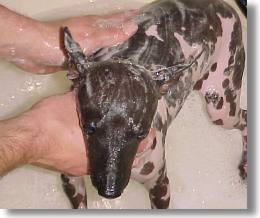
First a bath....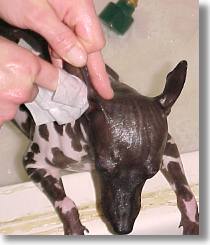
Clean the ears out...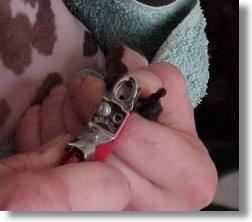
And finally a nail trim.
- Day of show!
You'll want to pack everything the night before (and you might want
to make a checklist to be sure you don't forget anything!). You'll
need your show leash and collar, probably will want a crate and bed
for a nice, safe place for your dog to relax when not showing, take
some water from home and a bowl, some plastic bags to clean up any
doggy messes, a chair for you. Don't forget your dog's registration
info! UKC registration comes with an "Easy Entry" card you
can carry to the show that has all the pertinent information you will
need. You might want to carry proof of vaccines and rabies, especially
if going to another state. Check the show information - these might
be required. I'm a "better to have it and not need it" person
which means I take everything but the kitchen sink - my husband would
be content taking the dog and the leash. Make sure you have what you
will need and anything that will make it more comfortable for you.
Dress comfortably but nicely. Some people where 'business casual'
while others wear jeans. Whatever works best for you, just make sure
it is clean and neat. Where safe comfortable footwear too - you'll
be running and moving and you don't want to slip or have aching feet.
Make sure you have good directions to the show site and leave with
plenty of time to make it without stressing yourself. Tell your dog
how great he his, tell yourself how much fun you'll have, make sure
everything's in the car and off you go!
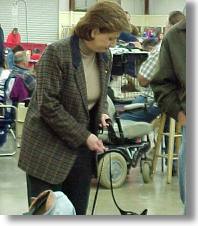
An outfit like this - casual but nice and comfortable - is perfect for the show ring.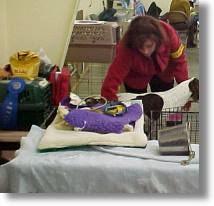
This owner has several dogs. You can see her grooming and crating supplies and other items.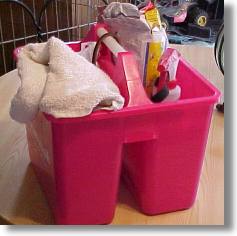
A tote box with a handle makes a great container for all your show supplies.
- Now you've arrived
at the show. Good grief look how busy it is! How will you know where
to go??? It's not all that bad. If you chose a small multi breed show
there are probably just one or two rings. If you chose a large all
breed show it may be busy. But the chaos will sort itself out and
UKC exhibitors are usually quiet friendly and helpful. First let your
dog have a quick break to potty (and be sure to clean up after him!),
especially if it's been a long ride. Find a safe place for him to
rest in his crate if possible (don't leave him locked in the car,
especially on a warm day!!). Now look around - or ask someone nearby
- and find the sign in table. This is where you will enter your dog
in the show. Make sure you carry your Easy Entry card and the entry
fee money! Don't be afraid to ask for help in filling it out - the
people taking entries should be glad to help. Double check and make
sure your dog is in the right age class, all the needed info is filled
in fully and your entry is signed. You should receive an armband with
your number. Don't lose it! This will go around your upper left arm
to identify you to the judge (s/he cannot see your name or dog's name
- only a number). Check or ask for a rubber band to hold it on your
arm. Now - you are safely entered. The show starts in a little bit.
Ask which ring your breed will be in or check the signs posted next
to the rings for a list. Now you know where to go. Go back to your
dog, have a sit down and relax a little. Do any last minute prettying
up (to you or your dog!) and make sure you spend a few minutes letting
your dog enjoy everything, giving him encouragement and making this
a happy experience. Remember - this is all strange to him to and he's
relying on you to let him know it's all OK and fun!
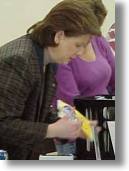
An exhibitor entering and getting
her armband.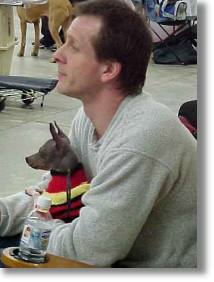
A chair, a bottle of water and a chance for dog & owner to relax before entering the ring.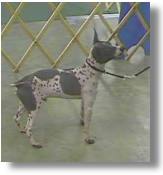
This AHT practices outside the ring.
- Time for the
show to start. If you looked at the posted list of breeds in your
ring you will see how many are ahead of you. If there isn't any, or
just one or two you might want to get ready. If there are several
breeds, let your dog relax and take the opportunity to watch the judging
and see first hand how a show happens. Is all your training starting
to make a little sense? OK, your breed is coming up! Don't be inattentive
and miss your class (it can happen). Get Fido out and let him stretch,
potty and get himself together. Give him a few minutes of encouragement
or practice. Now - get near the ring gate so you can hear the steward
(that's the 2nd person in the ring at the table that's calling each
class to come in), just be sure not to block the ring entrance! Don't
be afraid to let the steward know this if your first show. Most will
be happy to try and help you get to the right spot at the right time.
But don't be lollygagging around and not paying attention! You breed
is up! Males will be judged first, classes in order from puppy to
adult. There might not be entries in every class so don't assume you
have a long time to wait. Females will be judged second. Listen to
the steward - s/he will call each class and each number in the class.
When you hear your number go in the ring!
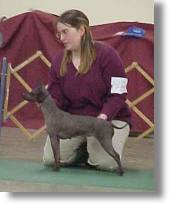
An exhibitor has entered the ring and has stacked her AHT while waiting for the judge.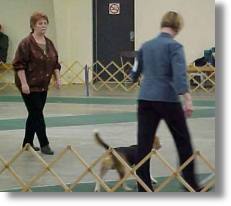
The judge sends an exhibitor around the ring to gait her Beagle. The exhibitor is moving counter clockwise with the judge in the center.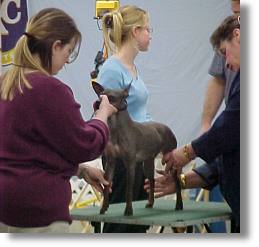
This handler is keeping her AHT's head still while the judge exams the dog.
- Oh boy! Now
you're here and everything is moving so fast! Take a deep breath,
calm down and go for it. OK - go to the spot the steward indicated
along the side of the ring (if you're not sure, ask!). Stack your
dog on the floor. The judge is probably out in the middle of the ring
taking a first look over the entrants. At his signal you will then
gait (trot) your dog around the edge of the ring counterclockwise.
Don't run up on the exhibitor in front of you! When you get back around
the ring the first person in line will put their dog on the table
for examination (if that's you be sure to do it!). Make sure the dog
is between you and the judge, stack him like you did in practice and
wait. The judge will take a look, then approach. He will ask you to
show your dogs bite (his teeth), then will go over your dog. Make
sure you have control of your dog's head. If you practiced at home
he should be used to this. When the judge is done he will probably
tell you "down and back" (or another pattern he will explain).
Take your dog off the table, and trot him down the diagonal mat away
from the judge and then back. Stop a few feet away from the judge
and let your dog stand naturally - the judge is looking to see what
he looks like on his own. At the judge's signal trot your dog again
around the edge of the ring to the end of the line. Whew! That wasn't
so bad was it? When all the dogs are examined they will probably all
gait around the ring together again. The judge may rearrange you in
line before this so be paying attention. Going around the last time
listen to the judge and keep an eye on him - this is when he will
point to his 1st through 4th place winners. He didn't point to you?
That's ok - leave the ring politely and try again next time. Did he
point at you? Congratulations! You got a placement! Go to the side
of the ring next to the stewards table (there are probably some numbered
signs) and stand in order (if you won 1st you will be first in line).
Make sure the judge can see your armband so he can write it in his
book. Now he'll hand you a ribbon - thank him and you can leave the
ring. ALWAYS be polite - thank the judge, congratulate your competitors
and be gracious whether you win or lose. Even if you think you should
have done better always smile and congratulate the winners. Remember,
knowing how to lose graciously is the key to good sportsmanship.
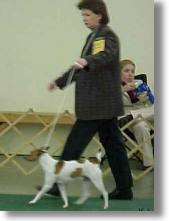
An exhibitor gaits her Rat Terrier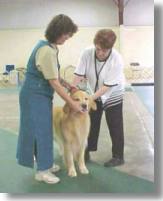
The judge goes over this Golden Retriever while the exhibitor keeps control of the dog's head.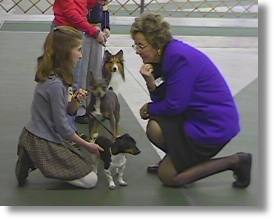
This judge takes a few moments to help a new exhibitor. Most judges are really quiet friendly. If you are polite they are happy to help.
- But wait! Did
you win 1st or 2nd place? Don't go away! All the first place winners
will go back in the ring (this is called Winners class). When your
number is called again you'll go back in the ring and do it all over,
though it might go quicker since the judge has seen all the dogs once
already. This time he will choose his "Winners" male or
female. Once the Winners is chose he leaves the ring and the dog that
placed 2nd to him in the classes comes into the ring to compete for
Reserve Winners. Confused? It gets easier as you do it. Stay near
the ringside and don't be afraid to ask someone more experienced to
help you follow everything. If you won Winners you'll need to stick
around. Otherwise you can let your dog have a drink of water and go
back to his crate to rest. You might want to come back and watch the
rest.
- Now they will
judge the Champions class, then the Grand Champions class. Once the
winners of those are chosen, the Best Male, Best Female, best Champion
and best Grand Champion will come back into the ring and compete for
Best of Breed. One of the two winners (of Best Male/Female) will also
be chosen as Best of Winners. Once Best of Breed is chosen, judging
is over for that breed until later. Later in the day the Best of Breed
winners will compete for Best in Group and Best in Show.
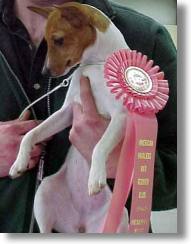
This AHT puppy has won a rosette
for best puppy!! All the training has paid off!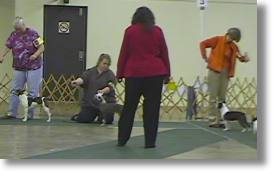
A Judge considers her Best In Show lineup. Everyone is working hard to make their dog look best , waiting and hoping for that signal that they won!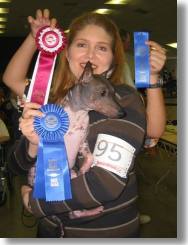
This is one happy owner!
- Well, your first
show is over. It was probably a whirlwind but you're excited and ready
for your next one to start! If your lucky you have a ribbon or even
a rosette to take home and show off, and maybe a few championship
points as well. Make sure your dog is comfortable and pack up your
stuff. Make absolutely sure to clean up any trash you have and any
poop your dog might have made. Then head home to think about your
first time. And when you get home take what you learned, practice
some more and ask questions. You might have met some people at the
show willing to help - stay in touch with them. You might have made
some new friends! And good luck at your next show!
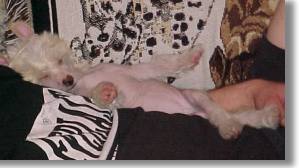
This tired Chinese Crested puppy enjoys relaxing at home after a day at the shows.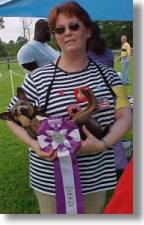
Another pooped puppy. It's hard work winning those rosettes!
- A special note
about kids. UKC welcomes kids in the Junior Showman class. This can
be a fun hobby for a child and his or her pet, as well as making the
show weekend a family event. Even young children can participate in
the Peewee classes with a parent's help! Many of today's top breeders
or handlers started out in the Juniors ring. Not every show offers
a Juniors class, so be sure to check the show information listing.
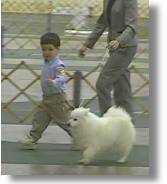
A young showman proudly takes his dog around the ring with Mom's help.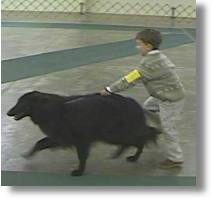
Sometimes the dog is almost as big as his handler! But this child seems to have it well in hand.
![]()
Take
me back to the top!
Previous
Page | Next
Page | Home
| Site
Map | Email
Us
![]()
Web site design and header graphics by: Silent
Caiman Web Design. Wudnshu AHT Logo designed by Argostar.
Thank you for the photos! Photos have been provided by: Kadyweb
Photography, Wudnshu
Kennel, Wytoka
Kennel and Woodland
Manor Kennel.
Photo ©Copyrights remain with the respective photo owners. Do not
use, copy, distribute or alter these photos without permission.
This page written and copyrighted by Kady Harrington. ©2003 This
article is reproduced here with the express permission of the author.
This site ©2003 Wudnshu AHTs unless otherwise noted.